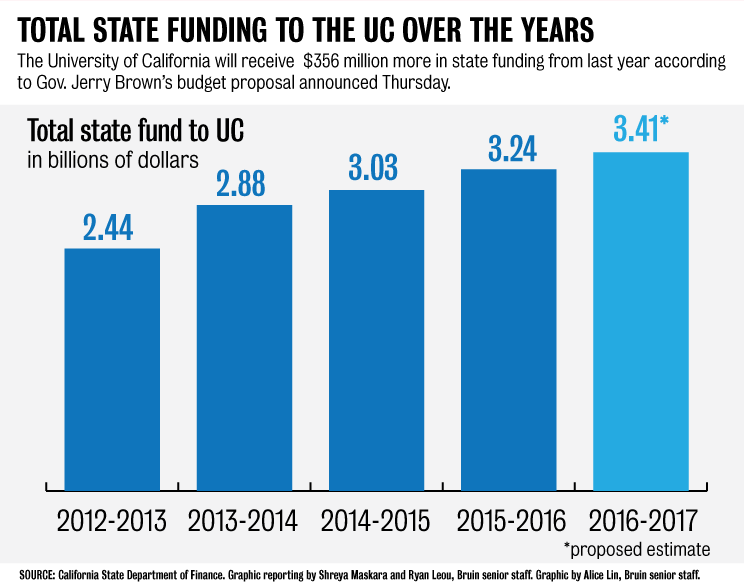Gov. Brown’s budget proposal raises state funding to UC by 4.7 percent

The University of California will receive $356 million more in state funding, according to Gov. Jerry Brown’s $170 billion budget proposal announced Thursday.
This year’s proposal allocated 4.7 percent more funding to the UC than last year’s budget. The UC will receive a total of $3.41 billion in state funding if the proposal is approved. Brown proposed a total funding of $30 billion for higher education, which includes the UC system, the California State University system and the California Community Colleges, among others.
According to the proposal, the UC will receive an additional $125 million from the state’s General Fund. The plan also allocates $35 million for UC maintenance projects and $25 million for projects intended to reduce greenhouse emissions at the UC.
The University will receive $171 million this year to help pay for unfunded liabilities in its retirement plan, as UC President Janet Napolitano and Brown agreed in May 2015. Last spring, the state promised a total of $436 million over three years to help reduce the UC’s long-term pension debt of $7.8 billion.
The state expects the UC to revise its pension plan and draft a new set of retirement benefits that will include a lower pension tier, as Napolitano and Brown decided in May.
According to the proposal, the state will also offer about $2.1 billion through the Cal Grant program, which supplements about 43 percent of all financial aid demand for higher education. If approved, this would be a 14-percent increase in the number of students receiving Cal Grants.
Kevin Sabo, president of the University of California Student Association, which advocates on behalf of UC students, said in an email statement he thinks the budget fails to ensure students’ food and housing security but he appreciated the state’s effort to keep tuition rates flat.
The UC will keep in-state tuition rates flat for the next two years, according to the budget announcement last May,
Sabo added he thinks the high cost of a UC education often forces students to live in unsafe and substandard housing. He added he thinks the University and the state should work together to to comprehensively address student needs when reviewing the budget proposal.
Several student leaders expressed concern about the viability of increasing student enrollment given the funding offered from the state when the UC Regents approved a plan in November that aims to increase resident enrollment in the UC by 10,000 students over the next three years.
Zach Helder, undergraduate student government external vice president, said he doesn’t think the proposal addresses concerns about what he called over-enrollment in the UC system.
“The funding we receive from the state is significantly lower than what we need to support the levels of enrollment expected by the state,” Helder said.
Dianne Klein, a spokesperson for the UC, said she thinks the budget reflects the state’s willingness to help the UC keep tuition flat. The UC will continue to work with the legislature to address issues such as sustaining expanded access and energy, transportation and other initiatives, Klein added
Brown also proposed an additional $2 billion payment to the state’s rainy day fund and an additional $1.4 billion for Medi-Cal to pay for its expansion under the Affordable Care Act.
The governor will release a revised proposal in May 2016 and the deadline for the legislature to approve the budget is July 1.
Contributing reports by Allison Ong, Bruin reporter.

